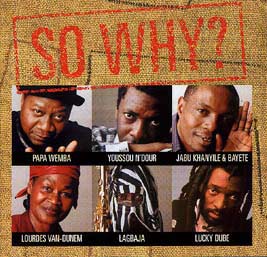







Text and photos,
except where otherwise credited, © African Musicians Profiles, 2001-2004.
Graphics created by Spitfire-Design. Backgrounds by coolnotions. PLEASE
DO NOT USE ANY TEXT OR PHOTOS WITHOUT CONTACTING AFRICAN MUSICIANS PROFILES
FOR PERMISSION BY EMAIL!!! |
|
African
Music @ The Movies
Some movies that have contemporary African
music on their soundtracks are listed below, arranged by title
in alphabetical order - if you know of any others, email the
details to: [email protected]
Also visit africine, a
site with information on thousands of African films.
| Movie
title |
Music/Musician |
| A
Dry White Season |
Ladysmith
Black Mambazo |
| Abouna* |
Ali
Farka Toure |
| Africa
United |
various
including Pinise Saul and Lucky Ranku |
| Ali |
Salif
Keita |
| Armadillo
|
Baaba
Maal, Geoffrey Oryema and more ... |
| Amandla! |
Various
South African |
| Bamako |
Oumou
Sangare and more ... |
| Barbecue
Pejo* |
Jean
Odoutan |
| Beloved |
Oumou
Sangare |
| Beseiged |
Papa
Wemba |
| Blood
Diamond |
Emmanuel
Jal with Abdel Gadir Salim |
| Broken
Flowers |
Mulatu
Astatke |
| Bunny
Chow |
Souad
Massi |
| Cesaria
Evora* |
Cesaria
Evora |
| Constant
Gardner |
Ayub
Ogada |
| Cry
Freedom |
Various
South African |
| Dirty
Pretty Things |
JJC
& 419 Squad |
| Disgrace |
Angelique
Kidjo, Dorothy Masuka |
| Dôle* |
Annie-Flore
Batchiellilys |
| Hideous
Kinky |
Jil
Jilala |
| Feel
Like Going Home |
Habib
Koite and others |
| First
Grader |
Vieux
Farka Touré and more |
| Football
Fables |
Various
Ghanaian |
| From
a Whisper |
Eric
Wainaina and others |
| Hotel
Rwanda |
Afro
Celts |
| Hyenes* |
Wasis
Diop |
| I
Dreamed of Africa |
Muungano
Choir |
| If
... |
Sanctus
- Missa Luba |
| In
the Cut |
Zap
Mama |
| Invictus |
Various
South African |
| Je
Chanterai pour Toi |
Boubacar
Traoré |
| Jit |
Oliver
Mtukudzi |
| Jungle
2 Jungle |
Youssou
N'Dour and others |
| Kirikou
and the Sorceress |
Youssou
N'Dour |
| La
Projection* |
Amadou
and Mariam |
| Last
King of Scotland |
Afrigo
Band, E. T. Mensah and others |
| La
Vie est Belle |
Papa
Wemba |
| Le
Déchaussé* |
Cheikh
Lô |
| Life
on Earth* |
Salif
Keita |
| Maasai
|
Richard
Bona |
| Madame
Brouette* |
Ndeye
Seneba Seck |
| Même
le Vent* |
Ahmedou
Doukoure |
| Missisipi
Masala |
Pepe
Kalle |
| More
than Just a Game |
Vusi
Mahlasela |
| My
Voice* |
Tony
Reis & Vilma da Silva |
| Neria
|
Oliver
Mtukudzi |
| Phat
Girlz |
Super
Mazembe |
| Pray
the Devil Back to Hell |
Angelique
Kidjo |
| Return
to Gorée |
Youssou
N'Dour |
| Sarafina!
|
Various
South African |
| Sisters
in Law |
D'Gary |
| Shooting
Dogs |
Cecile
Kayirebwa |
| Soul
Power |
Miriam
Makeba, Tabu Ley Rochereau & others |
| Stigmata |
Afro
Celt Sound System |
| Suffering
And Smiling |
Fela
Kuti, Femi Kuti |
| Tears
of the Sun |
Various
(composed by Hans Zimmer) |
| The
Absence |
El
Hadj N'Diaye, Aster Aweke, Youssou N'Dour |
| The
Beach |
Mory
Kante |
| The
Ebony White Man* |
Marco
Beacco & Loy Ehrlich |
| The
Gods must be Crazy |
Various
South African |
| The
Mummy |
Various
North African |
| The
Pledge |
Wazimbo
& Orchestra Marrabenta Star de Mocambique |
| The
Sheltering Sky |
Various
North African |
| The
Visitor |
Fela
Kuti |
| Thomas
Crown Affair |
Wasis
Diop |
| Three
African Tales |
Yvan
Kazan, Ali Wague & Djeli Moussa Conde |
| Town
of Runners |
Mulatu
Astatqe, Emahoy Tsegué-Maryam Guèbru |
| Tsotsi |
Various
South African |
| Une
Femme pour Souleymane* |
Diogal
Sakho |
| Waiting
for Happiness* |
Oumou
Sangare |
| Xalima
la plume* |
Sedina
Insa Wade |
| Yellow
Card |
Oliver
Mtukudzi and others |
| Yesterday
|
Various
South African |
| 500
Years Later |
Abdul
Tee-Jay and others |
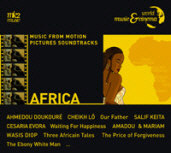
|
In
the above list, movies with * have a track
on the compilation World Music and Cinema Set Vol. 7: Africa
Part of a set of soundtracks from around the world. Each
compilation is regionally themed with distinctive and original
music from well-known and cult feature films and documentaries.
The Africa CD has songs by Cheikh Lô, Wasis Diop,
Cesaria Evora from movies such as Abouna and Hyenes.
The variety goes from the tingling sound of Oumou Sangare's
Djorolen to the rap of Tony Reis and Vilma da Silva.
Buy from Unknown
Public. |
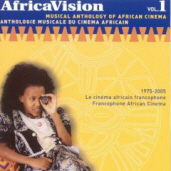 |
AfricaVision
Vol. 1 Buda
Musiques, 2006
A compilation of Francophone African cinema 1975
- 2005: nineteen tracks from films including Ouaga
saga from Burkina Faso/France (track by Mokhtar Samba),
Article 15bis from Democratic Republic of Congo
(track by So Kalmery), Circus baobab from France/Guinee/Burkina
Faso (track by Momo Wandel), La nuit de la verité
from Burkina Faso (track by Sami Rama), Le Métis
from Burundi (track Inanga by E. Bandora). The very useful
detailed accompanying notes in English and French have photos
and information about each track and also each film. |
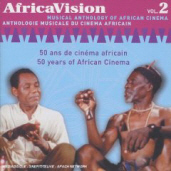 |
AfricaVision
Vol. 2 Buda
Musiques, 2006
50 years of African cinema: nineteen tracks
exploring the history of African films with stories of love
and comedy, their themes of tradition, poverty, hope and
solidarity, including Afrique sur Seine from the
film Afrique sur Seine (1955) - Senegal/France,
Wele by Zao from Matanga (1995) - Congo, Yaaba
by Francis Bebey from Yaaba (1988) - Burkina Faso,
Douga by Kouyate Sory Kandia from Djeli (1981)
- Ivory Coast. The very useful detailed accompanying notes
in English and French have photos and information about
each track and also each film. |
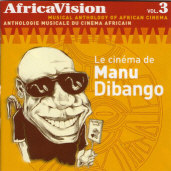 |
AfricaVision
Vol. 3 Buda
Musiques, 2007
Le cinema de Manu Dibango: nineteen tracks
from Manu, the film composer. The detailed accompanying
booklet has notes in French and English which include an
interview with Manu and summaries about the movies and film-makers
(Idrissa Ouedraogo, Ousmane Sembene amongst others). There
are also many historic photos of Manu. The films are, for
example, Silences (1990) directed by Beatrice Soule
which is about Manu himself going to Cameroon and recalling
his childhood - 3 tracks are from that film. |
Africa
Anthems
There is a list below of several songs appealing for peace and unity
for Africa, a strong, serious and important message from many African
musicians. Over Christmas and New Year 2000/2001, the only programme
on British TV that dwelt on Africa was a repeat on Channel 4 shown
at 2.30 a.m. on 31/12/2000, Music goes to War. It was a documentary
showing a tour by Youssou N'dour, Papa Wemba, Lucky Dube, Lourdes
Van-Dunem. Jabu Khanyile and Lágbájá
('the man without a face who speaks for those without a voice')
to war torn areas such as Sudan and Angola. There were true moving
examples of how music can aid healing. After the tour a CD was made
that has the song So why?, performed in Paris in 1997. All
proceeds from the sale of the CD go towards Red Cross relief projects
in Africa.
Have
a look at the list of 'Africa Anthems' below - if you have any other
suggestions to add to the list, email them to: [email protected]
Africa
Anthems
Salif
Keita Africa on Mundo Afrika compilation
Latin
Quarter Radio Africa on Mundo Afrika compilation
Majek
Fashek So Long on One World compilation
Youssou
N'Dour New Africa on Joko
Franklin
Boukaka Le Bucheron on A Paris CD
Manu
Dibango Aye Africa (new arrangement of Franklin Boukaka's
Le Bucheron) on Mboa'Su CD
Soweto
String Quartet Sikelela on Renaissance CD
Papa
Wemba and Koffi Olomide Wake Up on Wake Up CD
Koffi
Olomide African Kings on Attentat CD
Remmy
Ongala One World on Mambo CD
Mose
Fan Fan Jolie Africa on Belle Epoque CD
Albert
Nyathi and Imbongi God Bless Africa on Welcome to Zimbabwe
CD
Vicky
Sampson African Dream on Empresses of Africa CD
Alpha
Blondy Les Imbeciles on Yitzhak Rabin CD
Oliver
Mtukudzi Ngoma Nehosho on Paivepo CD
Samba
Mapangala Africa Yetu on Karibu Kenya CD
Samba
Mapangala Umoja ni Nguvu on Ujumbe CD |
 |
Observations on the Kenyan music scene,
April 2001
Walking
through the streets of the Kenyan capital, Nairobi, or any
town such as Nanyuki or Mombasa, you don't have to look for
a music shop or stall - let your ears direct you because the
music is played out onto the streets to attract attention!
Nowadays it is often gospel music in Kiswahili or other local
languages that you'll hear. One of the music shops on Nairobi's
River Road is �Kamaru's City Sounds' owned by Joseph Kamaru,
one of Kenya's best known musicians. Since his conversion
to Christianity in 1993 Joseph has been devoted to gospel
music but his music dating from about forty years ago is still
selling well and relevant today.
 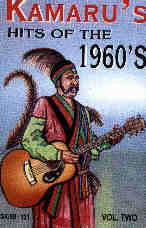
One
of Kamaru's songs on the album Hits from the 1960s,
�Ndari ya Mwarimu'(The Teacher's Darling), is to be part of
a drama, Slow down my teacher, you've gone too far!,
written by JPR Ochieng-Odero, to be performed by ProPerArt
Creations in many towns in Kenya, Uganda and Tanzania later
in 2001. The play seeks to increase young people's awareness
of the social issue of teacher-pupil relationships, a unique
example of collaboration between a musician and playwright.
Indeed,
social issues and commentaries on tragic events often form
the basis of popular songs and plays in Kenya. In a radio
interview on Kenya Broadcasting Corporation in April, Sam
Muthee talked about his latest version of his classic �Dereva,
Chunga Maisha' (Driver, care for life) which seeks to advise
motorists to avoid road accidents. Composers, Sam Muthee included,
also wrote songs about the bomb blast that claimed so many
lives in Nairobi in 1998.
In
the year 2001 there is a lot more variety of music available
in Kenya than previously which is good for tourists or visitors
because they will definitely hear something they like in hotels,
at discos or being performed live. The number of radio stations
has also multiplied and although there is a lot of British
and American pop and r&b played, the range does seem to
be increasing. In particular, South African township music
has come on the scene and Brenda Fassie is one of the international
stars to have performed in Kenya recently. Her song 'Nakupenda'
is definitely a favourite. Congolese music is ever popular
and the band Extra Musica (winners of Best African Band at
the last KORA awards) performed live in Mombasa, Nairobi and
Kisumu in March.
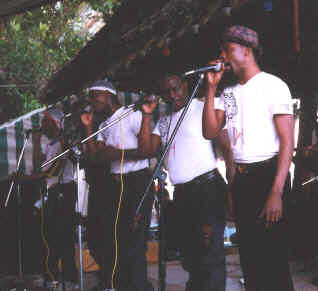
Extra Musica performing at Bamburi, Mombasa
There
are a few established locally based bands such as Les Mangelepa,
Les Wanyika and Forvics playing regularly at various venues.
Despite
the fact that there may be benefits of having a wide range
of music available in the media, the message from talented
Kenyan musicians themselves is that they should be given centre
stage first, rather than having to struggle to be heard in
the midst of so much imported music. On a positive note, the
number of local archived songs being released on cassette
is increasing, such as 'It's Disco Time with Samba Mapangala
and Orchestre Virunga' on the Tamasha label. |
|
 |
|
Uncle
Sam of Africa's African Beats
radio show
As
the presenter of the popular African Beats programme on
London's Choice 107.1 FM radio station, Uncle Sam frequently
interviewed guest musicians and other prominent people.
Some of his guests were connected with various charities
and they had the opportunity to publicise their work or
forthcoming events. Some of Uncle Sam’s studio guests
were: Kanda Bongo Man (Congo), Mose
Fan Fan (Congo) Afel Bocoum (Mali), N'Faly
Kouyate (Guinea), Lagbaja
(Nigeria), Dorothy Masuka (South
Africa) and Souad Massi (Algeria).
I decided to throw out a few questions to put him "on
the other side of the fence"!
A bit of background info about him: Sam was born in Ghana
and stayed there until 1977. With a degree in Economics
and Statistics from the University of Ghana in Legon,
he went to Nigeria to teach at a secondary school for
6 years. In 1983 Uncle Sam moved to Britain to study accountancy
and has been there since then but often travels to other
countries, for example he has been to France, South Africa
and Ghana.
Now for the questions and answers!
1 First of all, when did you start presenting
the African Beats show on Choice FM?
Sunday 7th May, 2000 at 3 pm.
2
Do you remember some of the tracks you played
for that first broadcast?
The first track I played is called Ozim Zim, by the Mariott
International Band of Ghana. This track is my signature
tune as well. Other tracks include Salif Keita's Bolon,
Africando's Gombo Salsa
3
Was it the first radio programme you ever presented?
Yes
4
Was your programme the first of its kind on Choice FM,
or did they have other African music programmes before?
No, we started with four shows on Tuesdays and Thursdays
9-11pm, Saturdays and Sundays 3-5pm of which I presented
the Sunday one jointly with Ata P.
5
What made you decide to become a presenter of African
Beats?
Curiosity. Just a challenge to myself.
6
What changes or improvements would you still like to have
for your programme and why?
It had always been my desire to play more of African Hiphop,
i.e. "young" music from Africa or by Africans
abroad. I use the narrow definition of "African"
here, meaning people born and bred in Africa and/or born
in Africa but living abroad.
7
What aspect of your presenting your programme is most
rewarding for you personally?
When people call in to thank me for playing a song from
their country or region. I love that because it is my
aim to make people feel homesick, or nostalgic.
8
While you lived in your homeland of Ghana and then for
a few years in Nigeria did you listen to the African popular
music of that time?
I am always into it. But my real collections started when
I arrived in London in December 1983 to study Accountancy.
I made friends from all over Africa and they introduced
me to their music.
9
Do you think African popular music is becoming more popular
in Britain and even world-wide in the 21st century?
Britain has a lot of catching up to do if they want to
rival France as a centre for African music. But I think
African music has made a big improvement in the UK. Thanks
to all the labels and promoters. Bands such as Orchestra
Baobab, the Malian musicians, Ladysmith Black Mambazo
have helped.
10
Finally, what's your all-time favourite African
music album?
Impossible to answer. Maybe Aki Special, which
has 'Sweet Mother'.
|
|
|
